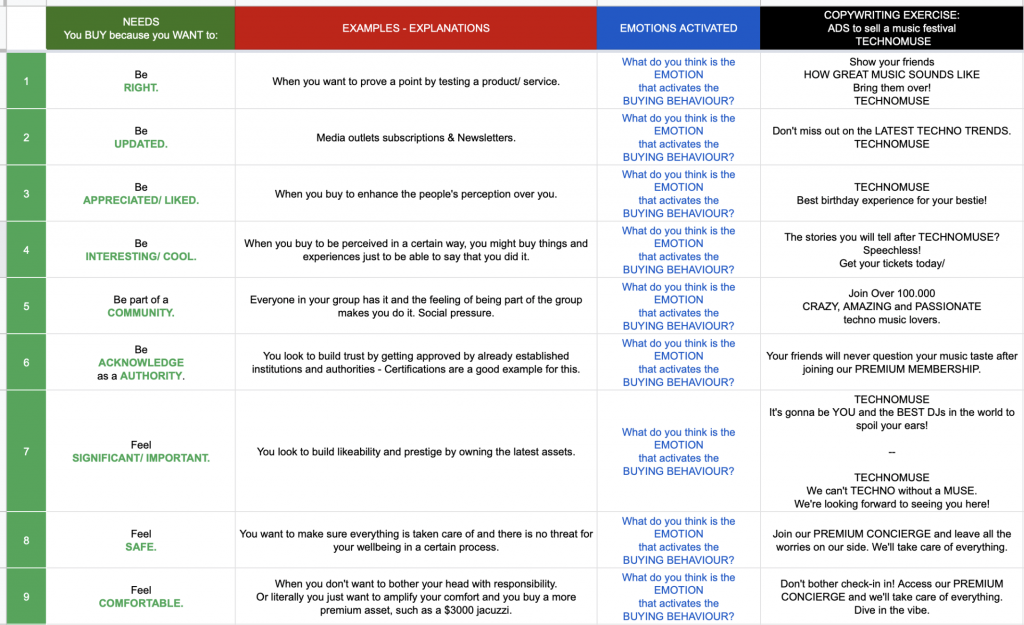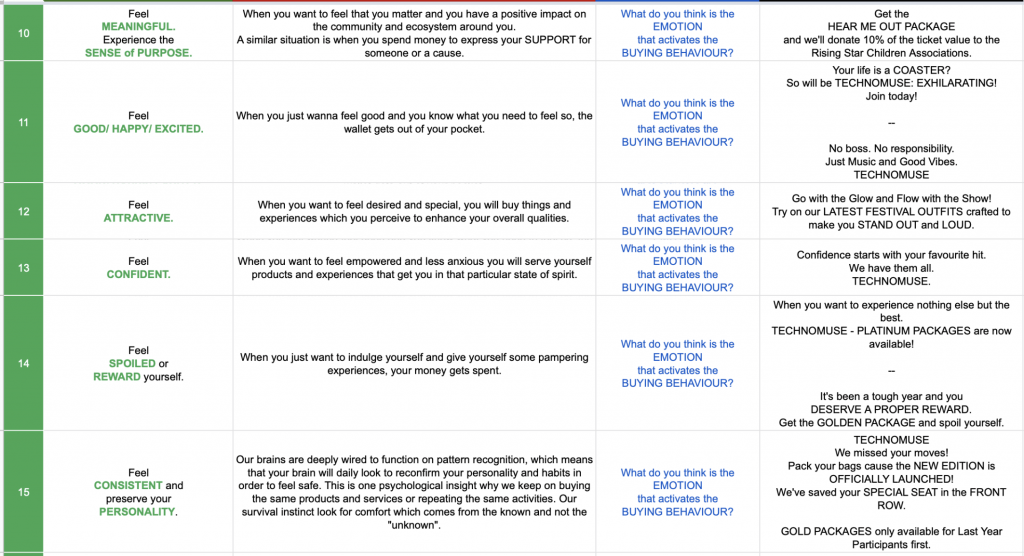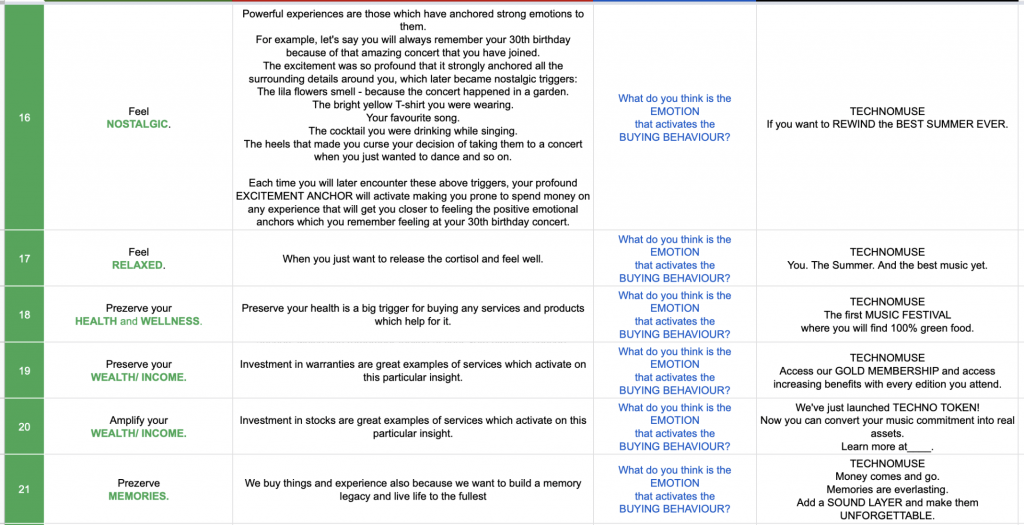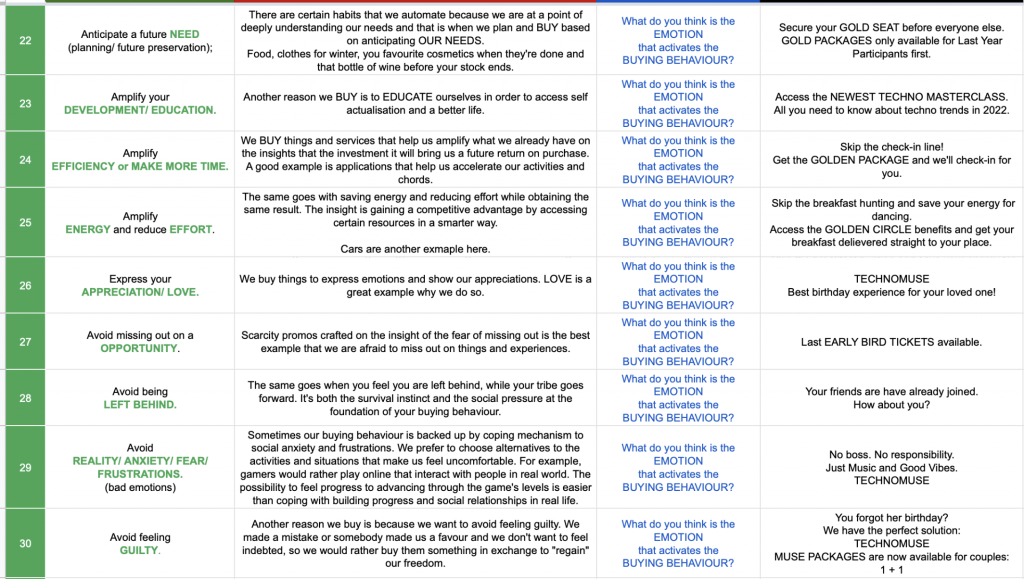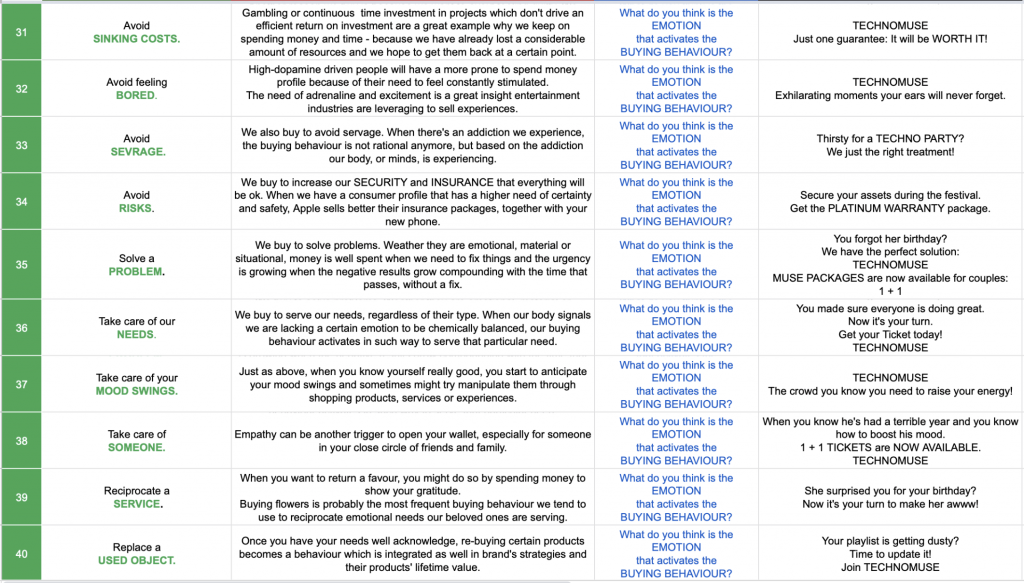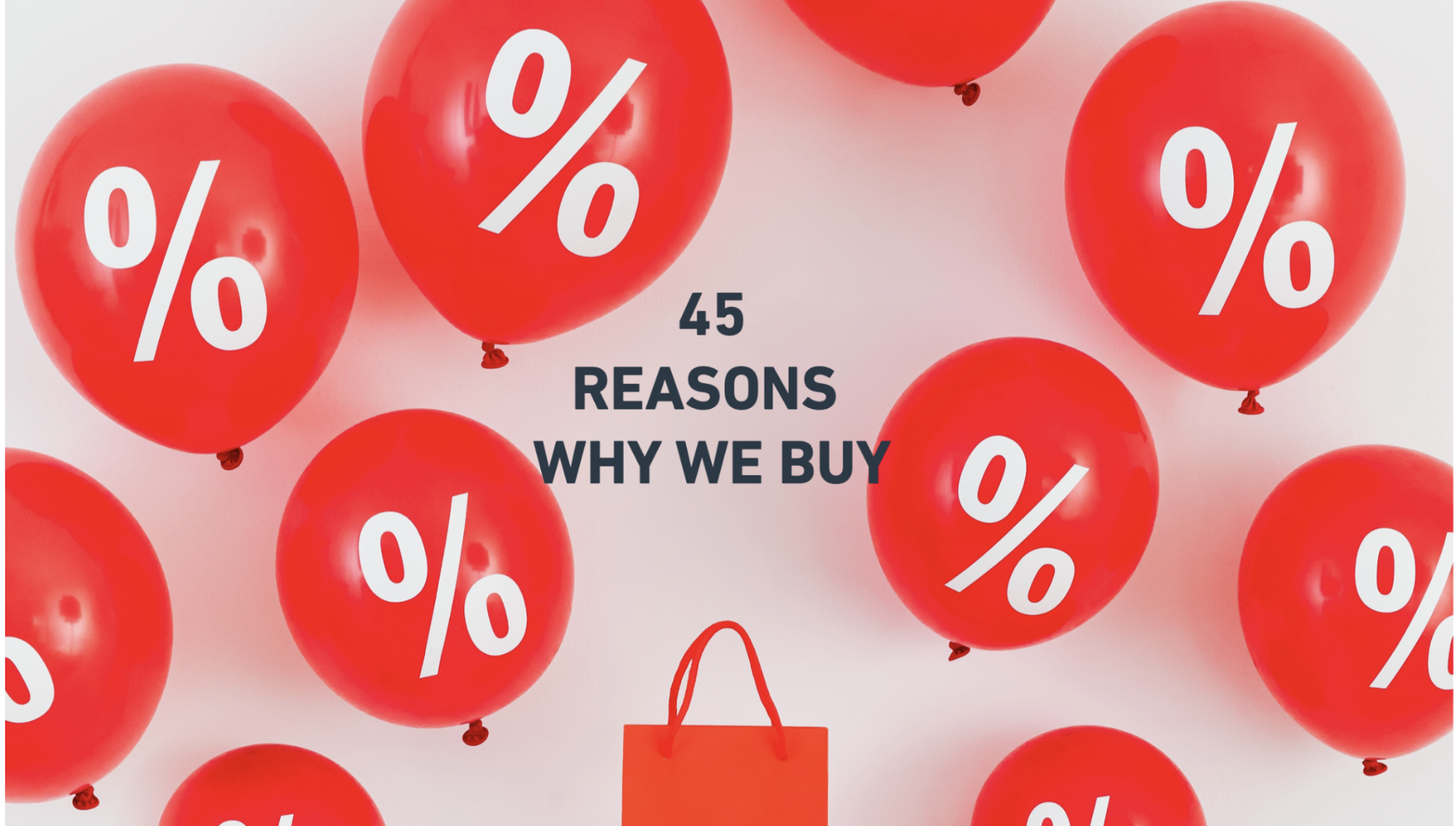
Did you ever think about how many reasons are behind our BUYING BEHAVIOURS? It’s amazing when you think about how many triggers can push the “take out the wallet” button. Once you understand them you can decript what stands behind each AD you see.
And of course, most times, it’s not just one reason and as they’re topping up, the chances you will buy certain things grow.
Moreover, our BUYING BEHAVIOURS are strongly corelated with the HUMAN NEEDS they are serving (Maslow’s Needs Pyramid can be used as a benchmark for this) and the EMOTIONS they get activated by (See Paul Ekman’s 6 Funndamental Emotions here).
=> You have a NEED that is triggered by a certain EMOTION. That emotion is then leveraged by a particular AD that activates your BUYING BEHAVIOUR corelated to serve that NEED.
NOW, THE CHALLENGE: Find the EMOTION!
So, my proposal is this: I have out put together for you 45 REASONS why people buy, together with the explanations for each of them. What you have to do is to play and identify the emotion behind that triggers the buying behaviour.
On a side, to reinforce the explanations I have took a particular experience: a music festival and took it throughout all of the 45 NEEDS so you can explore how ADS can be customly crafted to trigger a certain need.
Find the template here, together with 45 DIFFERENT WAYS to write an AD depending on the NEED they trigger.
Enjoy!
You BUY things & services when you WANT to:
- Be part of a COMMUNITY => Everyone in your group has it and the feeling of being part of the group makes you do it => Social pressure.
- Be ACKNOWLEDGE as a AUTHORITY =>You look to build trust by getting approved by already established institutions and authorities – Certifications are a good example for this.
- Feel SIGNIFICANT/ IMPORTANT => You look to build likeability and prestige by owning the latest assets.
- Feel SAFE => You want to make sure everything is taken care of and there is no threat for your wellbeing in a certain process.
- Feel COMFORTABLE => When you don’t want to bother your head with responsibility. Or literally you just want to amplify your comfort through buying a more premium asset, such as a $3000 jacuzzi.
- Feel MEANINGFUL => Experience the SENSE of PURPOSE. When you want to feel that you matter and you have a positive impact on the community and ecosystem around you. A similar situation is when you spend money to express your SUPPORT for someone or a cause.
- Be RIGHT => proving a point by testing a product/ service.
- Be UPDATED => subscribing to Media outlets subscriptions & Newsletters for example.
- Be APPRECIATED/ LIKED => buying to enhance the people’s perception over you.
- Be INTERESTING/ COOL => buying to be perceived in a certain way or buying things and experiences just to be able to say that you did it.
- Feel GOOD/ HAPPY/ EXCITED. => When you just wanna feel good and you know what you need to feel so, the wallet gets out of your pocket.
- Feel ATTRACTIVE => When you want to feel desired and special, you will buy things and experiences which you perceive to enhance your overall qualities.
- Feel CONFIDENT => When you want to feel empowered and less anxious you will serve yourself products and experiences that get you in that particular state of spirit.
- Feel SPOILED or REWARDED => When you just want to indulge yourself and give yourself some pampering experiences, your money gets spent.
- Feel CONSISTENT and preserve your PERSONALITY => Our brains are deeply wired to function on pattern recognition, which means that your brain will daily look to reconfirm your personality and habits in order to feel safe. This is one psychological insight why we keep on buying the same products and services or repeating the same activities. Our survival instinct look for comfort which comes from the known and not the “unknown”.
- Feel NOSTALGIC => Powerful experiences are those which have anchored strong emotions to them. For example, let’s say you will always remember your 30th birthday because of that amazing concert that you have joined. The excitement was so profound that it strongly anchored all the surrounding details around you, which later became nostalgic triggers:
The lila flowers smell – because the concert happened in a garden.
The bright yellow T-shirt you were wearing.
Your favourite song.
The cocktail you were drinking while singing.
The heels that made you curse your decision of taking them to a concert when you just wanted to dance and so on. Each time you will later encounter these above triggers, your profound EXCITEMENT ANCHOR will activate making you prone to spend money on any experience that will get you closer to feeling the positive emotional anchors which you remember feeling at your 30th birthday concert. - Feel RELAXED => When you just want to release the cortisol and feel well.
- Prezerve your HEALTH and WELLNESS => This is a big trigger for buying any services and products which help doing it such as pharmaceutical products, bio food or yoga retreats.
- Preserve your WEALTH/ INCOME => Investment in warranties are great examples of services which activate on this particular insight.
- Amplify your WEALTH/ INCOME => Investment in stocks are great examples of services which activate on this particular insight.
- Prezerve MEMORIES => We buy things and experience also because we want to build a memory legacy and live life to the fullest.
- ANTICIPATE a future NEED (planning/ future preservation) => There are certain habits that we automate because we are at a point of deeply understanding our needs and that is when we plan and BUY based on anticipating OUR NEEDS. Food, clothes for winter, you favourite cosmetics when they’re done and that bottle of wine before your stock ends.
- Amplify your DEVELOPMENT/ EDUCATION => Another reason we BUY is to EDUCATE ourselves in order to access self actualisation and a better life.
- Amplify EFFICIENCY or MAKE MORE TIME => We BUY things and services that help us amplify what we already have on the insights that the investment it will bring us a future return on purchase. A good example is applications that help us accelerate our activities and performances.
- Amplify ENERGY and reduce EFFORT => The same goes with saving energy and reducing effort while obtaining the same result. The insight is gaining a competitive advantage by accessing certain resources in a smarter way.
Cars are another exmaple here. - Express your APPRECIATION/ LOVE => We buy things to express emotions and show our appreciations. LOVE is a great example why we do so.
- Avoid missing out on a OPPORTUNITY => Scarcity promos crafted on the insight of the fear of missing out is the best example that we are afraid to miss out on things and experiences.
- Avoid being LEFT BEHIND => The same goes when you feel you are left behind, while your tribe goes forward. It’s both the survival instinct and the social pressure at the foundation of your buying behaviour.
- Avoid REALITY/ ANXIETY/ FEAR/ FRUSTRATIONS (bad emotions) => Sometimes our buying behaviour is backed up by coping mechanism to social anxiety and frustrations. We prefer to choose alternatives to the activities and situations that make us feel uncomfortable. For example, gamers would rather play online that interact with people in real world. The possibility to feel progress to advancing through the game’s levels is easier than coping with building progress and social relationships in real life.
- Avoid feeling GUILTY => Another reason we buy is because we want to avoid feeling guilty. We made a mistake or somebody made us a favour and we don’t want to feel indebted, so we would rather buy them something in exchange to “regain” our freedom.
- Avoid SINKING COSTS => Gambling or continuous time investment in projects which don’t drive an efficient return on investment are a great example why we keep on spending money and time – because we have already lost a considerable amount of resources and we hope to get them back at a certain point.
- Avoid feeling BORED => High-dopamine driven people will have a more prone to spend money profile because of their need to feel constantly stimulated.
The need of adrenaline and excitement is a great insight entertainment industries are leveraging to sell experiences. - Avoid SEVRAGE => We also buy to avoid servage. When there’s an addiction we experience, the buying behaviour is not rational anymore, but based on the addiction our body, or minds, is experiencing.
- Avoid RISKS => We buy to increase our SECURITY and INSURANCE that everything will be ok. When we have a consumer profile that has a higher need of certainty and safety, Apple sells better their insurance packages, together with your new phone.
- Solve a PROBLEM => We buy to solve problems. Weather they are emotional, material or situational, money is well spent when we need to fix things and the urgency is growing when the negative results grow compounding with the time that passes, without a fix.
- Take care of our NEEDS => We buy to serve our needs, regardless of their type. When our body signals we are lacking a certain emotion to be chemically balanced, our buying behaviour activates in such way to serve that particular need.
- Take care of your MOOD SWINGS => Just as above, when you know yourself really good, you start to anticipate your mood swings and sometimes might try manipulate them through shopping products, services or experiences.
- Take care of SOMEONE => Empathy can be another trigger to open your wallet, especially for someone in your close circle of friends and family.
- Reciprocate a SERVICE => When you want to return a favour, you might do so by spending money to show your gratitude.
Buying flowers is probably the most frequent buying behaviour we tend to use to reciprocate emotional needs our beloved ones are serving. - Replace a USED OBJECT => Once you have your needs well acknowledge, re-buying certain products becomes a behaviour which is integrated as well in brand’s strategies and their products’ lifetime value.
- Reduce UNCERTAINTY and feel more SAFE => When you want to increase your certainty of making the best decision you will spend money on services such as consulting for example or experts opinions. It happens when you don’t wanna compromise certain things. Spending money on private schools is another example of consumer behavior related to parents who don’t want to compromise their children education and they choose to reduce the risk around it.
- Experience ADVENTURE => Vacations, experiences, trying new hobbies.
- Experience FUN => Entertainment, games, experiences.
- Experience INNOVATION/ NEW => Gadgets/ technology, trainings.
- Experience SURPRISE & feed CURIOSITY => Trainings, books, documentaries.
